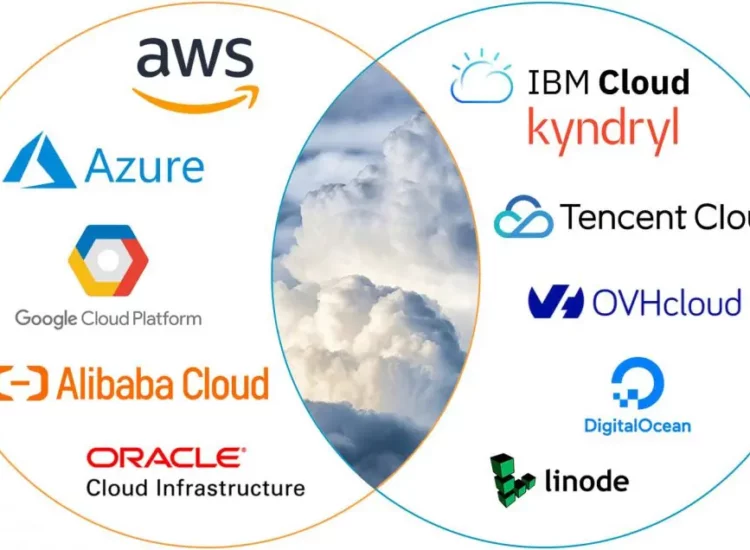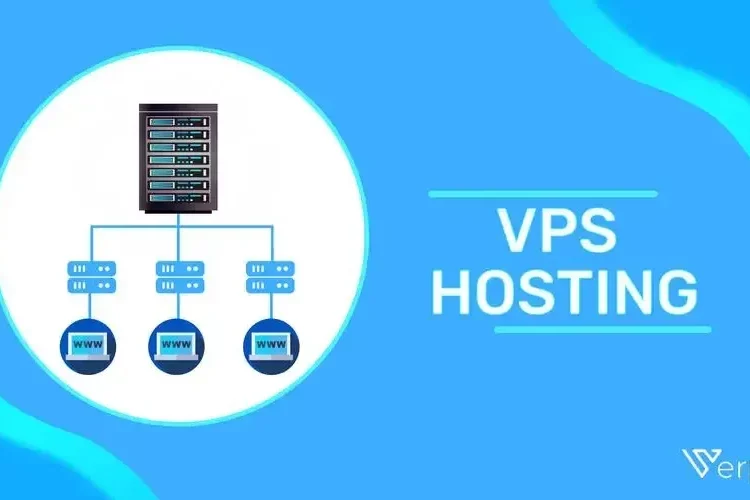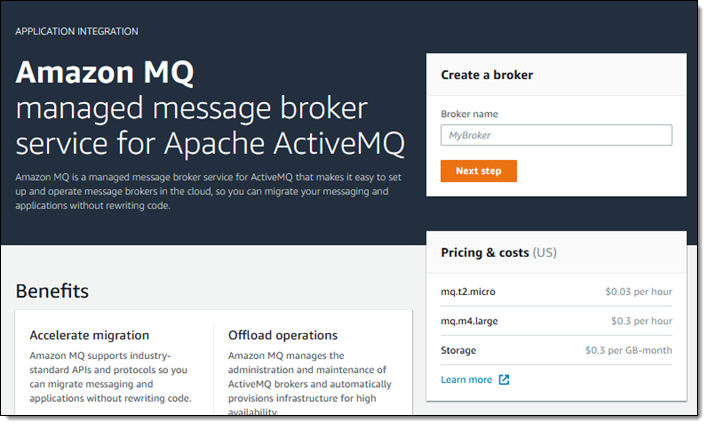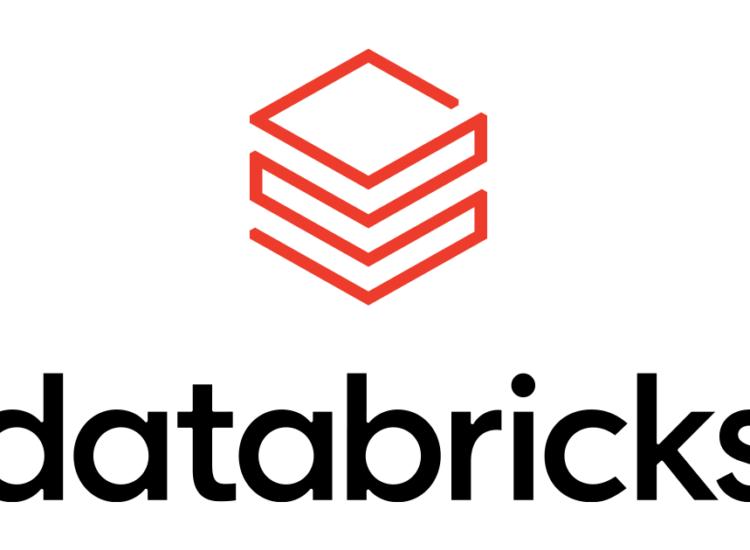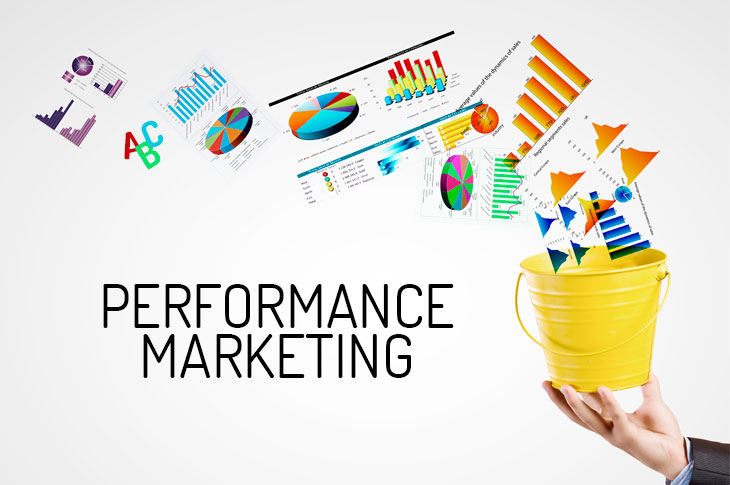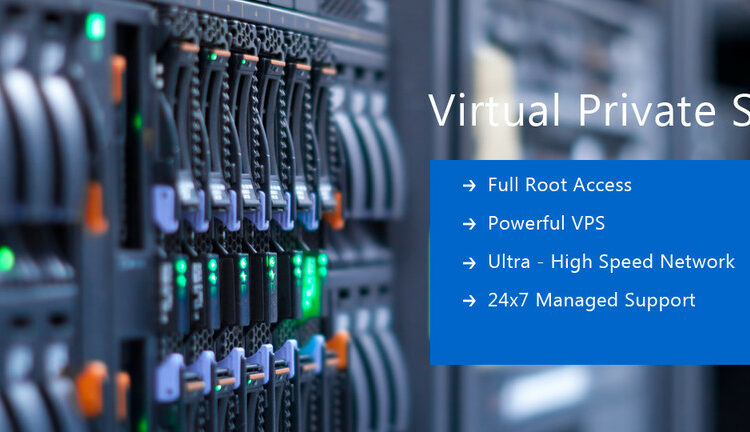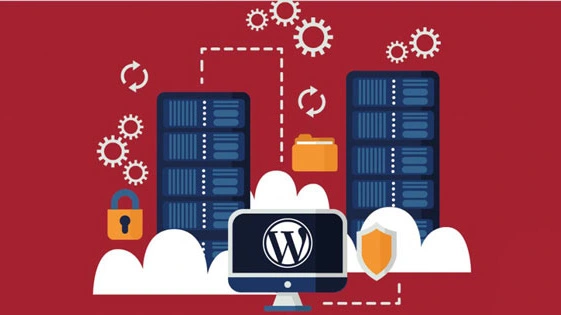In today’s fast-paced business world, organizations need a unified ERP solution that can handle all aspects of their operations. From finance and HR to procurement and supply chain management, companies are looking for a platform that can streamline processes, improve efficiency, and provide real-time visibility into their business.
Toc
That’s where Workday comes in – a cloud-based unified ERP solution designed to help businesses of all sizes elevate their operations. In this article, we will discuss how Workday’s unified approach can transform your business and give you a competitive edge in the market.
Introduction to Workday ERP

In today’s dynamic business landscape, having a robust Enterprise Resource Planning (ERP) system is crucial for streamlining operations and ensuring sustainable growth. These systems integrate various business processes, from HR to finance, into a unified platform, making operations more efficient and decision-making more informed. Among the leading solutions available, Workday ERP stands out for its seamless integration, advanced analytics, user-friendly interface, and scalability. This article will explore how Workday ERP can elevate your business and why it’s a compelling choice for modern enterprises.
What is Workday ERP?
Workday ERP is a cloud-based enterprise resource planning system that offers a unified platform for managing various business functions, including human resources, finance, and supply chain management. Unlike traditional ERP systems that may require multiple standalone applications, Workday provides an integrated approach, ensuring that all business processes work harmoniously together.
Key Benefits of Workday ERP
- Seamless Integration: Workday ERP integrates various business processes, ensuring a smooth flow of information across departments. This eliminates data silos and enhances collaboration.
- Advanced Analytics and Reporting: With robust analytics and reporting capabilities, Workday provides valuable insights that help business owners make informed decisions.
- Cloud-Based System: The cloud-based nature of Workday ERP offers flexibility and accessibility, allowing business owners and employees to work remotely and access real-time updates.
- User-Friendly Interface: Designed with business owners and managers in mind, Workday ERP’s intuitive interface makes it easy to navigate and utilize without extensive IT support.
- Scalability: Workday ERP grows with your business, accommodating changes in size and complexity, ensuring that your business is always well-supported.
How Workday ERP works and In what way it helps?
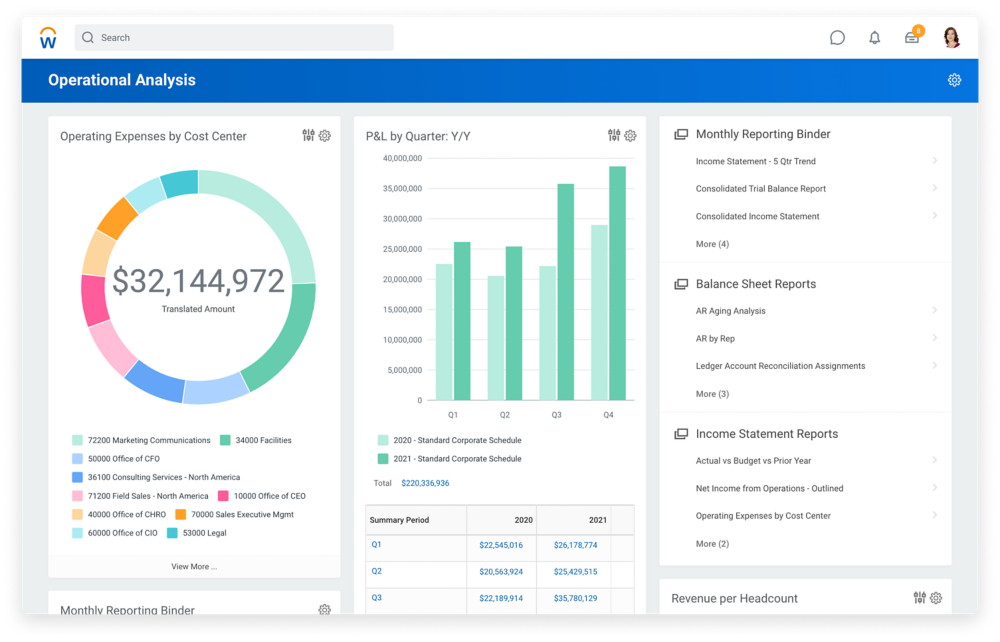
Workday ERP operates by providing a comprehensive suite of applications that support various essential business functions. This unified platform ensures seamless interaction between different modules such as human resources, finance, and supply chain management. The cloud-based architecture enables real-time data processing and accessibility, ensuring that business operations are always up-to-date and integrated.
Human Resources
Workday ERP simplifies HR processes by integrating talent management, payroll, benefits administration, and employee lifecycle management into a single system. This enables HR professionals to efficiently manage recruiting, onboarding, performance reviews, and succession planning. Workday’s user-friendly interface empowers employees to manage their profiles, submit time-off requests, and access important documents easily. Furthermore, the system’s advanced analytics provide insights into workforce trends, helping HR leaders make strategic decisions about talent development and retention.
Finance
Workday ERP offers comprehensive financial management capabilities, covering functions like accounting, expense management, procurement, and financial reporting. By automating these processes, Workday reduces manual effort and the risk of errors. The system also provides real-time financial insights, facilitating better budget management and forecasting. Businesses can streamline their financial operations, ensure compliance with regulatory standards, and improve the accuracy of financial data, leading to more informed and strategic decision-making.
Supply Chain Management
Workday ERP enhances supply chain management by integrating procurement, inventory management, order fulfillment, and supplier collaboration into one cohesive platform. The cloud-based nature of Workday ensures that all stakeholders have access to real-time data, improving visibility and coordination across the supply chain. This leads to more efficient inventory management, reduced costs, and faster response times to market changes or disruptions. Businesses can optimize their supply chain processes, ensuring that they maintain a competitive edge.
Workday ERP in Action
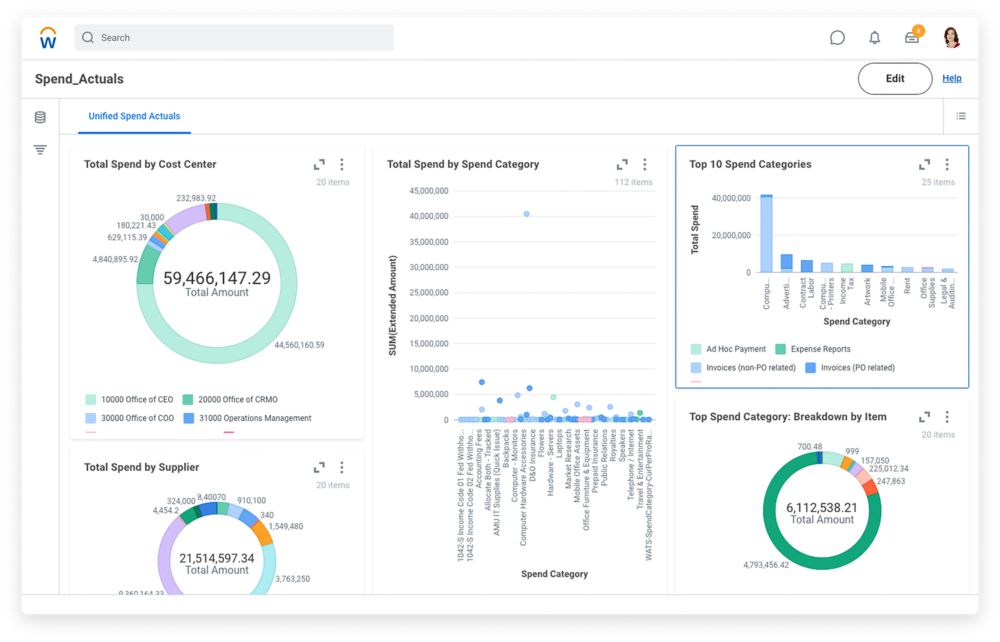
Implementing Workday ERP can significantly impact various business areas through its innovative solutions and comprehensive approach. Below, we will explore some real-world applications and successes of organizations that have adopted Workday ERP.
Case Study: Optimizing HR Processes
One of the most impactful areas where Workday ERP shines is human resources. For instance, a multinational corporation faced challenges with its fragmented HR systems, which hampered talent management and employee engagement. By implementing Workday ERP, they unified their HR processes, from recruitment to performance management, on a single platform. This not only streamlined operations but also provided managers with actionable insights through advanced analytics. Employee satisfaction and retention rates surged as a result of the improved user experience and efficient processes.
Case Study: Streamlining Financial Operations
Another example is a mid-sized manufacturing company that sought to improve its financial reporting and compliance. With Workday ERP, they integrated their financial operations, gaining real-time visibility into their financial health. The system’s powerful analytics capabilities allowed them to forecast trends accurately and optimize their budgeting processes. Furthermore, the cloud-based nature of Workday ERP ensured that their financial data was secure yet accessible to authorized personnel from anywhere, fostering a collaborative environment for financial planning and management.
Case Study: Enhancing Supply Chain Management
A leading retail chain implemented Workday ERP to tackle inefficiencies in its supply chain management. Previously relying on a patchwork of systems, they experienced frequent delays and stock discrepancies. With Workday ERP, they achieved end-to-end visibility into their supply chain, from procurement to inventory management. The seamless integration facilitated better supplier communication, reduced lead times, and optimized stock levels. Consequently, they experienced a substantial reduction in operational costs and improved customer satisfaction due to timely deliveries and better stock availability.
Comparison with Leading ERP Systems
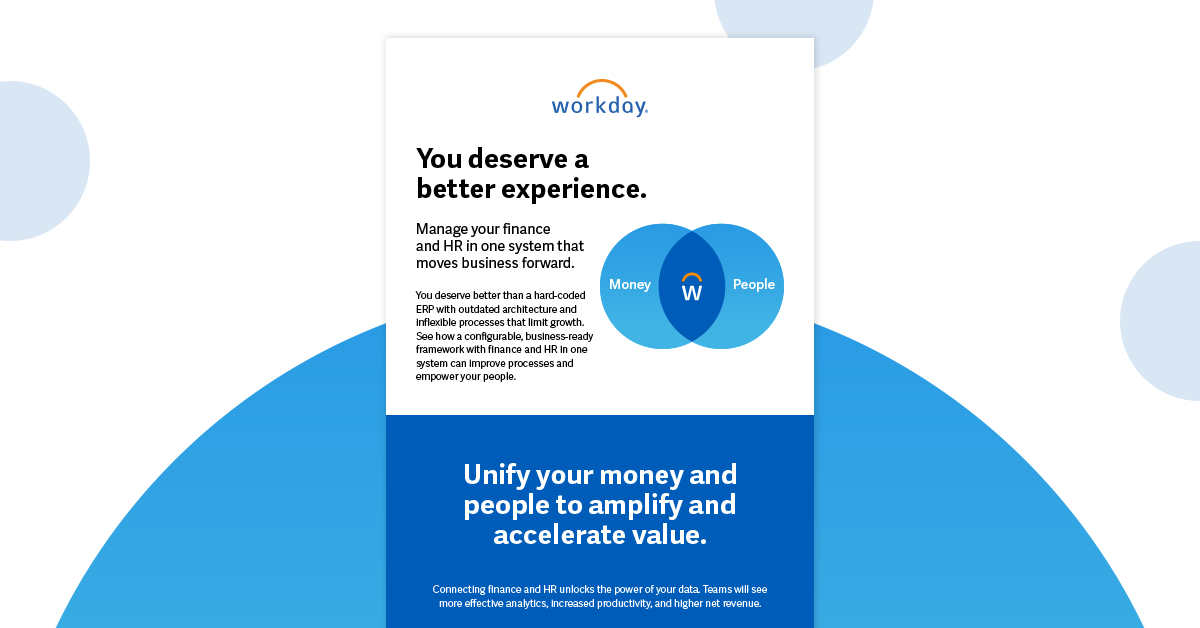
While Workday ERP has proven to be an invaluable asset for many businesses, it is essential to compare it with other leading ERP systems to fully understand its strengths and weaknesses.
Oracle ERP Cloud
Oracle ERP Cloud is another powerful cloud-based ERP solution that caters to a broad range of industries. Known for its robust features in finance, project management, procurement, and enterprise performance management, Oracle ERP Cloud offers extensive flexibility and scalability. However, it can be more complex to implement and may require greater technical expertise to customize and manage effectively.
SAP S/4HANA
SAP S/4HANA is a next-generation ERP solution that leverages in-memory computing to process large volumes of data quickly. It excels in areas like finance, supply chain, manufacturing, and asset management. SAP S/4HANA’s real-time analytics and comprehensive functionality make it a strong contender for large enterprises. Nevertheless, the implementation process can be lengthy and resource-intensive, often necessitating significant IT support and investment.
Microsoft Dynamics 365
Microsoft Dynamics 365 integrates ERP and CRM capabilities, providing a unified platform for business applications. It is particularly well-suited for small to medium-sized businesses due to its user-friendly interface and seamless integration with other Microsoft products like Office 365. Dynamics 365 boasts strong features in financial management, sales, customer service, and operations. However, it may lack some of the advanced functionalities and scalability required by larger enterprises.
Infor CloudSuite
Infor CloudSuite offers industry-specific ERP solutions, making it highly customizable and tailored to specific verticals such as manufacturing, healthcare, and retail. It combines deep industry functionality with robust analytics and AI capabilities. While Infor CloudSuite provides flexibility and industry-specific expertise, it may present a steeper learning curve and require more extensive user training.
Implementing Workday ERP for Your Business
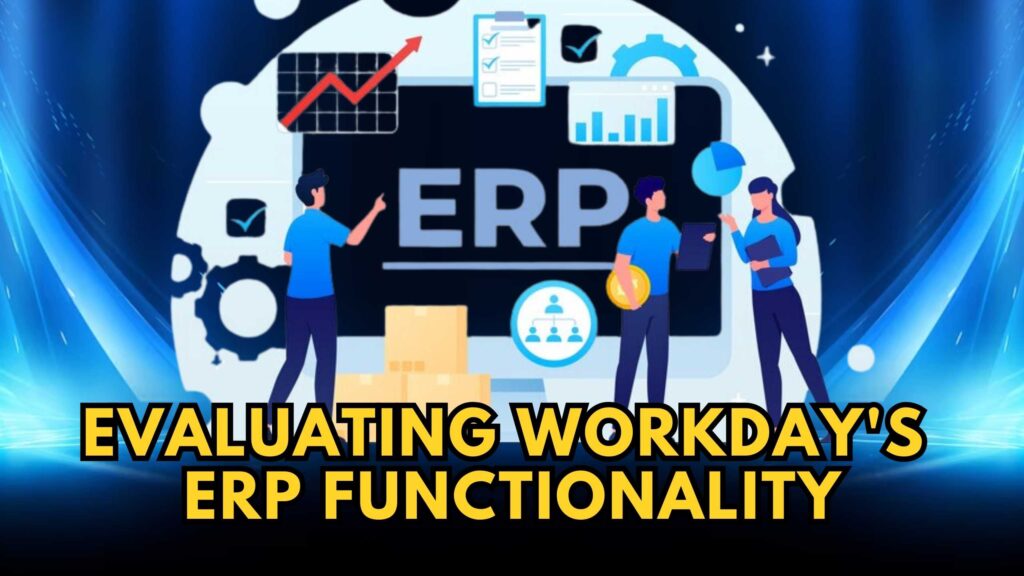
Workday ERP offers a comprehensive and modern approach to managing diverse business operations. Its user-friendly interface, powerful analytics, and seamless integration make it an attractive choice for businesses looking to enhance their efficiency and agility.
Steps to Integrate Workday ERP
- Assess Your Needs: Identify the specific needs of your business and how Workday ERP can address them.
- Plan the Implementation: Develop a detailed implementation plan, including timelines, milestones, and key stakeholders.
- User Training: Invest in training for your team to ensure they can effectively utilize the new system.
- Integration: Work with Workday consultants to integrate the ERP system into your current operations.
- Monitor and Adjust: Continuously monitor the performance of the ERP system and make necessary adjustments to optimize its use.
Factors to consider before working with Workday ERP
When considering the implementation of Workday ERP for your business, it is essential to evaluate several critical factors to ensure a successful deployment and long-term utilization.
- Budget and Costs: Carefully consider the total cost of ownership, which includes the initial implementation costs, licensing fees, and ongoing maintenance expenses. Workday ERP is a premium solution, and while it offers comprehensive features, it is essential to ensure it aligns with your budgetary constraints.
- Scalability: Analyze how well Workday ERP can grow with your business. Whether you are scaling up your operations, expanding into new markets, or diversifying your business offerings, the ERP system should be able to support your growth without significant disruptions.
- Customization Requirements: Determine the level of customization you need. While Workday ERP provides a robust standard package, businesses with unique requirements may need to customize the system to fit their workflows and processes better.
- User Adoption: Assess the readiness of your team to adopt the new system. Change management is crucial to the successful implementation of an ERP system. Ensuring that your employees are on board and adequately trained can make a significant difference in the effectiveness of the system.
- Vendor Support and Resources: Investigate the quality of customer support and resources offered by Workday. Having access to responsive and knowledgeable support personnel can help address any issues promptly, reducing downtime and maintaining business continuity.
- Integration with Existing Systems: Examine how well Workday ERP can integrate with your current IT infrastructure. Seamless integration with existing tools and software is vital to avoid data silos and ensure that your operations remain uninterrupted.
- Compliance and Security: Review Workday ERP’s compliance with industry standards and regulations relevant to your business. Additionally, consider the security measures in place to protect sensitive data from breaches and unauthorized access.
Common Challenges in ERP Implementation
Implementing an ERP system can significantly transform an organization’s operations, but it is not without its challenges. Here are some common obstacles that businesses may face during the ERP implementation process:
- Resistance to Change: Employees accustomed to existing processes may resist new systems and workflows, hindering the adoption and success of the ERP implementation. Effective change management strategies and clear communication can help alleviate this resistance.
- Data Migration Issues: Transferring data from old systems to the new ERP can be complex and time-consuming. Ensuring data accuracy, consistency, and completeness is critical to mitigate risks associated with data migration.
- High Costs and Budget Overruns: ERP implementation can be costly, with expenses arising from software licensing, hardware upgrades, consulting fees, and ongoing maintenance. Proper planning and budgeting are essential to avoid financial strain.
- Customization Difficulties: Customizing an ERP system to meet unique business needs can extend implementation timelines and increase costs. Striking a balance between customization and standard functionality is key to a successful deployment.
- Integration Challenges: Integrating an ERP system with existing tools, software, and databases can be complex, especially if they are from different vendors. Thorough testing and a robust integration strategy can help mitigate potential issues.
- Lack of User Buy-in and Training: Employee resistance due to inadequate training or lack of understanding of the benefits of the new system can impede adoption and hinder its effectiveness. Investing in user training and creating a culture of support for the new system is crucial.
- Scalability Limitations: Some ERP systems may not effectively scale with business growth, leading to inefficiencies and disruptions down the line. Conducting thorough research and selecting an ERP system that can accommodate future growth is essential.
Conclusion
Workday ERP offers a comprehensive solution for businesses looking to streamline operations, enhance decision-making, and grow sustainably. Its seamless integration, advanced analytics, user-friendly interface, and scalability make it an ideal choice for modern enterprises. By adopting Workday ERP, business owners can unlock new levels of efficiency and competitive advantage. However, it is crucial to carefully assess your business needs and evaluate the factors mentioned above to ensure a successful deployment and long-term utilization of the system. So, if you are considering implementing an ERP system for your business, Workday ERP can be an excellent choice to achieve your goals effectively. As technology continues to evolve, it is essential for businesses to stay updated with modern solutions like Workday ERP to remain competitive in the market and drive growth.
